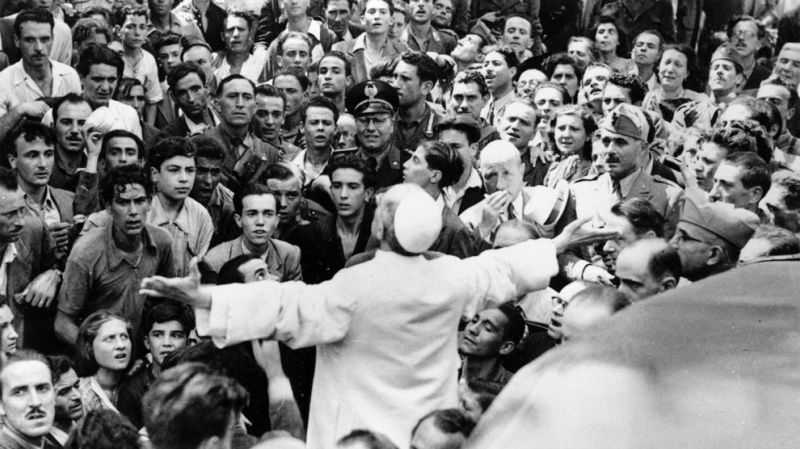
A JAMES RUDIN, in an article first published on Religion News Service, welcomes Pope Francis’ announcement that the Vatican archives covering the reign of Pope Pius XII will finally be opened…
There have been more positive encounters between Roman Catholics and the Jewish people since the conclusion of the Second Vatican Council in 1965 than there were in the first 2,000 years of the Christian church. But one major flashpoint has remained unresolved: the bitter controversy swirling around the role played by Eugenio Pacelli, whose 19-year pontificate as Pius XII began in 1939, in the wartime treatment of European Jews.
On Monday Pope Francis announced that the Vatican archives covering Pius XII’s reign will at last be opened. I have been personally involved in this dispute for more than three decades and have long demanded that this obstacle needs to be fully and finally removed if the historic revolution in Catholic-Jewish relations is to deepen and advance.

Men, women and soldiers gather around Pope Pius XII, his arms outstretched, during his inspection tour of Rome, Italy, after American air raids in World War II, on Oct. 15, 1943. PICTURE: AP Photo.
“The most serious charge made against Pius XII by his critics, Catholic and Jewish, is that he was inactive, indifferent, and ineffective in the face of Nazi Germany’s horrific policy of mass murder during the Holocaust, when six million Jews were killed in the heart of what Pope John Paul II has called ‘Christian Europe’.”
The most serious charge made against Pius XII by his critics, Catholic and Jewish, is that he was inactive, indifferent, and ineffective in the face of Nazi Germany’s horrific policy of mass murder during the Holocaust, when six million Jews were killed in the heart of what Pope John Paul II has called “Christian Europe.”
Pius XII’s “silence” and inaction in the face of radical evil, it is charged, helped seal the fate of the Jews in Europe.
The criticism of Pius XII surfaced as early as the mid-1960s, after The Deputy, a play by the German Protestant playwright Rolf Hochhuth presented a thinly disguised account of the Pope’s activities during the war. The play created such a public furor that Pope Paul VI ordered that more than 5,000 pages of official Vatican records from the wartime period be released to the public to counter Hochhuth’s claim that Pius XII failed to respond adequately to the Nazi regime’s genocidal policies.
The release of those documents was concluded in 1981, but it did not silence Pacelli’s critics. In fact, it had the opposite effect. Because the 5,000 pages represented only a carefully selected partial record, demands intensified in the 1980s and 1990s that all pertinent Vatican records be made available to appropriate scholars, both Christians and Jews, for intensive study. Back then, I wrote that while the limited release of Vatican documents was necessary, it was not sufficient.
The demands for full disclosure were consistently rejected, even when two prominent American Cardinals, Joseph Bernardin of Chicago in 1992 and John O’Connor of New York in 1996, joined in.
Speaking at Clark University in Worcester, Massachusetts, that year, O’Connor declared: “Yes, I would like to see [the archives] opened…It would be much better for the world, much better for the church, if the archives were opened tomorrow.”
In response, Vatican leaders have cited church policy that archival records cannot be released for 75 years – a justification that expires next year with the 75th anniversary of Nazi Germany’s defeat and the end of the Holocaust.
Many countries have long since exposed their own actions during the war. Since the end of the Cold War, previously closed records from the former Soviet Union, East Germany and a host of other countries became available for inspection. A collective act called “Heshbon Ha-Nefesh” (Hebrew for “inventory of the soul”) has assembled a critical analysis of the roles played during the Holocaust by Switzerland, Sweden, Spain and Portugal as well as other neutral nations and the Allies.
The potent issue of full disclosure and the so-called “silent” Pius XII has grown louder and stronger with each passing year. Few people are neutral about the Pope’s record and his response to contemporary attempts to save Jewish lives.
Many Catholic leaders and some Jews have vigorously defended Pius XII. By citing the strategically chosen archival sources to bolster the Pope’s reputation, however, Pacelli’s defenders have, perhaps unwittingly, fomented more debate and increased public demand for a full reckoning. Just as the Vatican can muster its version of the “truth,” so do the critics of Pius XII.
The spotlight of historical research and analysis must be focused on all parts of society – business, education, culture and religious bodies. No institution, least of all the global Roman Catholic Church, can be exempt from careful scrutiny.
Hopefully, Pope Francis’ welcome action of transparency and the total release of primary source material will soon be available for teams of scholars to analyse. Such measures will help bring a sense of closure to the vexing question that has hampered, even poisoned, Catholic-Jewish relations: what were the wartime actions of Pius XII?
“Pope Francis’ action is a welcome and constructive step. The time for obscuration, limited access, and fierce public arguments driven not by scholarly findings but by defensive feelings and incomplete data and information has come to an end.”
Unless and until this happens, the issue of the Vatican’s role during World War II will continue to cause friction, anger and bitterness between Catholics and Jews. Indeed, the controversy over Vatican archives still has the power to undo many of the extraordinary positive gains that have been achieved since 1965.
Pope Francis’ action is a welcome and constructive step. The time for obscuration, limited access, and fierce public arguments driven not by scholarly findings but by defensive feelings and incomplete data and information has come to an end.
Let the sunlight of openness flood the Vatican wartime archives. The entire world awaits.






